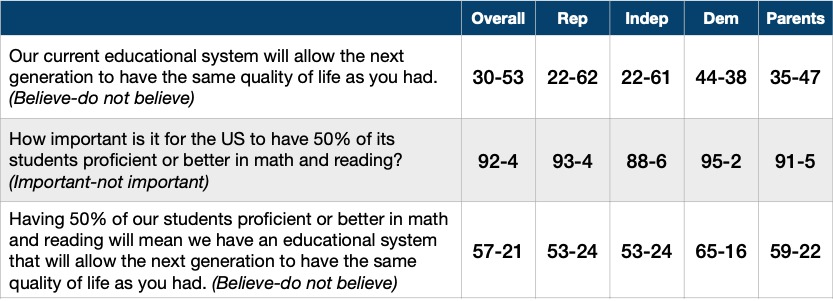Last week, we took a look at two questions related to the idea that recovering from learning loss and boosting student achievement should be the priorities for education policy: whether K-12 education gives students the skills they need to succeed as adults, and whether our current educational system will allow the next generation to have the same quality of life as you had. Generally speaking, the answer to both questions was no. As we saw last week, only 30% believed the statement Our current educational system will allow the next generation to have the same quality of life as you had, while 53% did not believe it.
What would mean that our current educational system was providing students with the skills they needed? At least part of the answer is achieving a certain benchmark of proficiency in math and reading. Some 92% of voters overall say that having 50% of US students proficient or better in math and reading is important (92-4 important-not important), with 77% calling it very important.
Even more importantly, voters connect academic capabilities with the quality of life students will be able to achieve as adults. By more than 2:1, voters believed the statement Having 50% of our students proficient or better in math and reading will mean we have an educational system that will allow the next generation to have the same quality of life as you had (57-21 believe-do not believe). This is also a bipartisan view, with 53% of Republicans (53-24), 53% of independents (53-24) and 65% of Democrats (65-16) believing this statement. Among parents, 59% believe it (59-22).

Voters recognize the importance of proficiency and see its connection to having a quality of life that at least meets if not exceeds that of the present. A next step for advocates and policymakers then might be to declare 50% proficiency, as measured by a test like NAEP, as a national goal, and then define the steps that would need to be taken to achieve this benchmark.







